Leadership and Management Report: Service Industry and Waldorf Astoria
VerifiedAdded on 2022/11/24
|11
|3532
|210
Report
AI Summary
This report delves into the intricacies of leadership and management within the service industry, using the Waldorf Astoria Hotels and Resorts as a case study. It begins by assessing classical management theories, such as scientific, bureaucratic, and administrative management, and their relevance to the service sector. The report then examines the distinct roles of leaders and the various leadership styles, including transactional, participative, and transformational approaches, employed in the industry. Furthermore, it evaluates the management and leadership styles practiced at the Waldorf Astoria, identifying both internal factors like personal traits and company culture, and external factors such as consumer types and technological changes that influence organizational structure. The report also assesses current and future 'hard' and 'soft' skills required for effective management and leadership, supported by evidence from the hospitality industry. The report concludes with a discussion on acquiring these skills for the future.
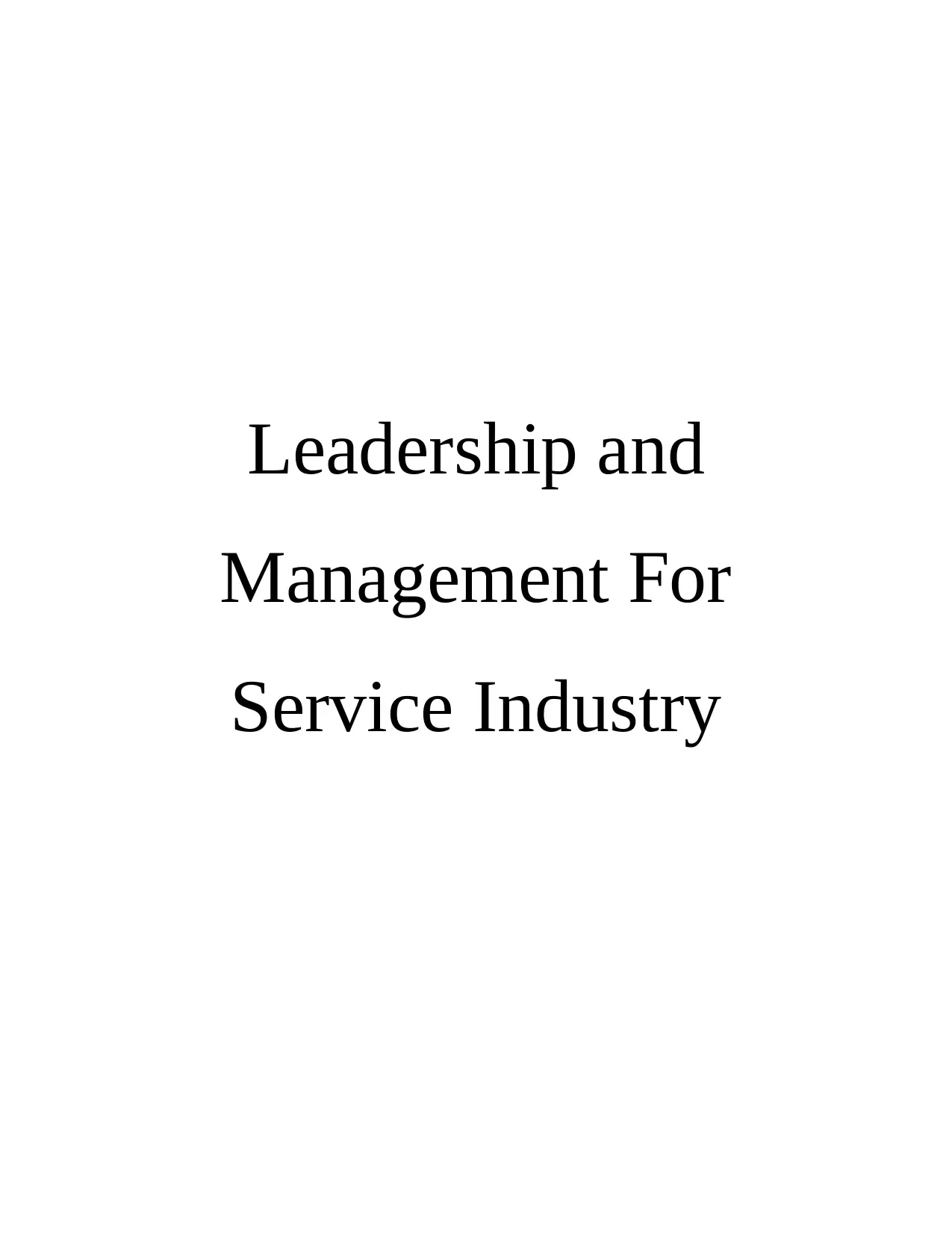
Leadership and
Management For
Service Industry
Management For
Service Industry
Paraphrase This Document
Need a fresh take? Get an instant paraphrase of this document with our AI Paraphraser
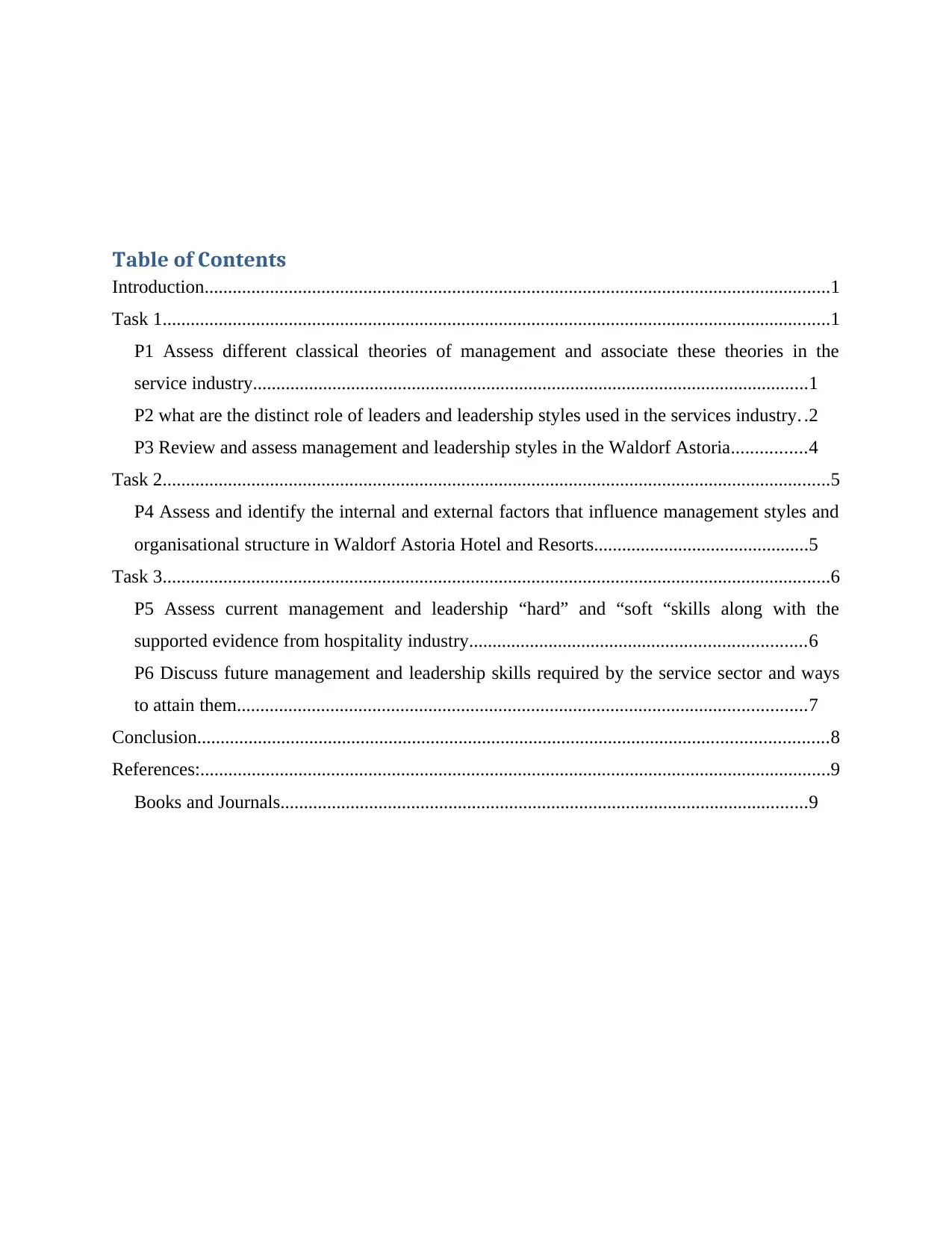
Table of Contents
Introduction......................................................................................................................................1
Task 1...............................................................................................................................................1
P1 Assess different classical theories of management and associate these theories in the
service industry.......................................................................................................................1
P2 what are the distinct role of leaders and leadership styles used in the services industry. .2
P3 Review and assess management and leadership styles in the Waldorf Astoria................4
Task 2...............................................................................................................................................5
P4 Assess and identify the internal and external factors that influence management styles and
organisational structure in Waldorf Astoria Hotel and Resorts..............................................5
Task 3...............................................................................................................................................6
P5 Assess current management and leadership “hard” and “soft “skills along with the
supported evidence from hospitality industry........................................................................6
P6 Discuss future management and leadership skills required by the service sector and ways
to attain them..........................................................................................................................7
Conclusion.......................................................................................................................................8
References:.......................................................................................................................................9
Books and Journals.................................................................................................................9
Introduction......................................................................................................................................1
Task 1...............................................................................................................................................1
P1 Assess different classical theories of management and associate these theories in the
service industry.......................................................................................................................1
P2 what are the distinct role of leaders and leadership styles used in the services industry. .2
P3 Review and assess management and leadership styles in the Waldorf Astoria................4
Task 2...............................................................................................................................................5
P4 Assess and identify the internal and external factors that influence management styles and
organisational structure in Waldorf Astoria Hotel and Resorts..............................................5
Task 3...............................................................................................................................................6
P5 Assess current management and leadership “hard” and “soft “skills along with the
supported evidence from hospitality industry........................................................................6
P6 Discuss future management and leadership skills required by the service sector and ways
to attain them..........................................................................................................................7
Conclusion.......................................................................................................................................8
References:.......................................................................................................................................9
Books and Journals.................................................................................................................9
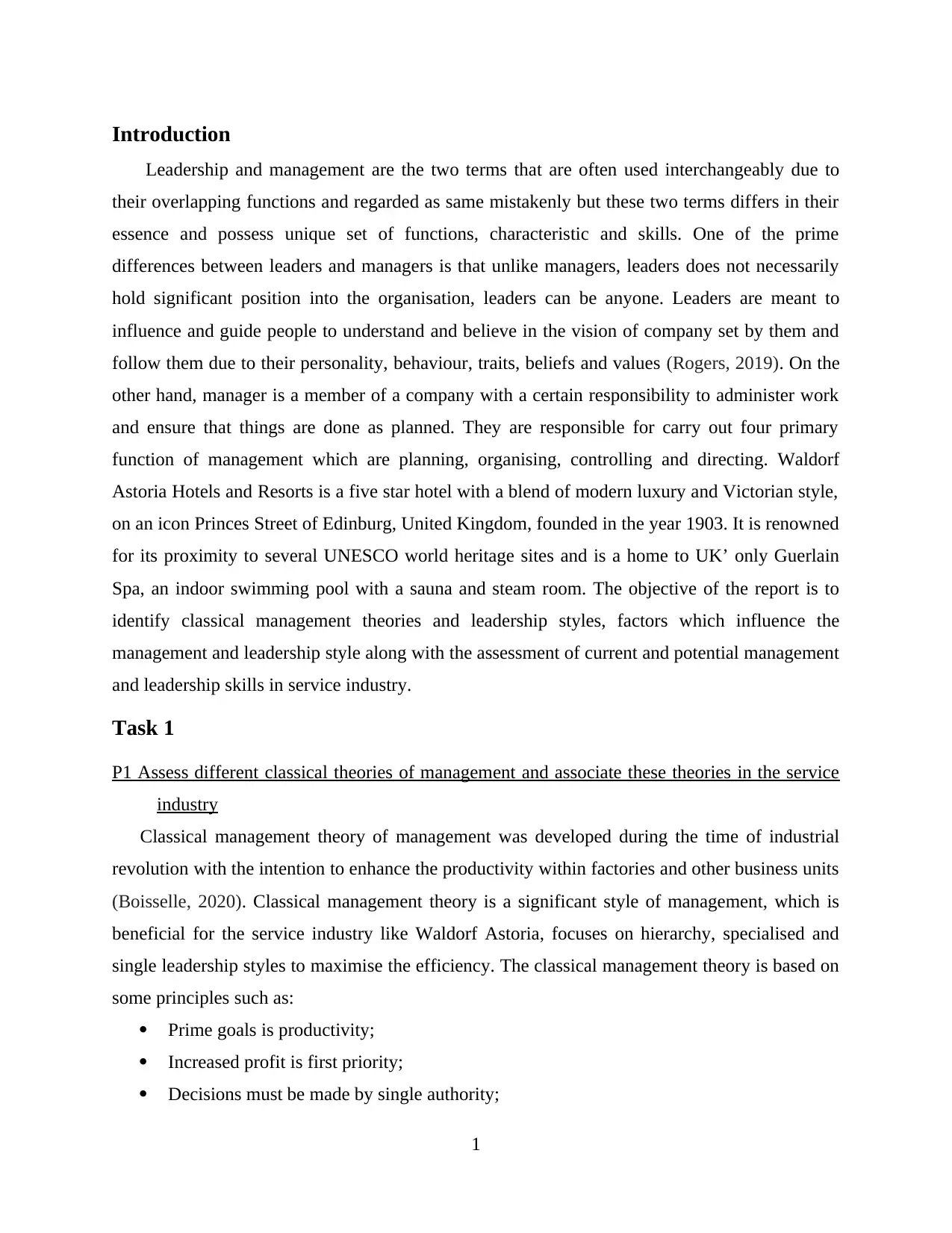
Introduction
Leadership and management are the two terms that are often used interchangeably due to
their overlapping functions and regarded as same mistakenly but these two terms differs in their
essence and possess unique set of functions, characteristic and skills. One of the prime
differences between leaders and managers is that unlike managers, leaders does not necessarily
hold significant position into the organisation, leaders can be anyone. Leaders are meant to
influence and guide people to understand and believe in the vision of company set by them and
follow them due to their personality, behaviour, traits, beliefs and values (Rogers, 2019). On the
other hand, manager is a member of a company with a certain responsibility to administer work
and ensure that things are done as planned. They are responsible for carry out four primary
function of management which are planning, organising, controlling and directing. Waldorf
Astoria Hotels and Resorts is a five star hotel with a blend of modern luxury and Victorian style,
on an icon Princes Street of Edinburg, United Kingdom, founded in the year 1903. It is renowned
for its proximity to several UNESCO world heritage sites and is a home to UK’ only Guerlain
Spa, an indoor swimming pool with a sauna and steam room. The objective of the report is to
identify classical management theories and leadership styles, factors which influence the
management and leadership style along with the assessment of current and potential management
and leadership skills in service industry.
Task 1
P1 Assess different classical theories of management and associate these theories in the service
industry
Classical management theory of management was developed during the time of industrial
revolution with the intention to enhance the productivity within factories and other business units
(Boisselle, 2020). Classical management theory is a significant style of management, which is
beneficial for the service industry like Waldorf Astoria, focuses on hierarchy, specialised and
single leadership styles to maximise the efficiency. The classical management theory is based on
some principles such as:
Prime goals is productivity;
Increased profit is first priority;
Decisions must be made by single authority;
1
Leadership and management are the two terms that are often used interchangeably due to
their overlapping functions and regarded as same mistakenly but these two terms differs in their
essence and possess unique set of functions, characteristic and skills. One of the prime
differences between leaders and managers is that unlike managers, leaders does not necessarily
hold significant position into the organisation, leaders can be anyone. Leaders are meant to
influence and guide people to understand and believe in the vision of company set by them and
follow them due to their personality, behaviour, traits, beliefs and values (Rogers, 2019). On the
other hand, manager is a member of a company with a certain responsibility to administer work
and ensure that things are done as planned. They are responsible for carry out four primary
function of management which are planning, organising, controlling and directing. Waldorf
Astoria Hotels and Resorts is a five star hotel with a blend of modern luxury and Victorian style,
on an icon Princes Street of Edinburg, United Kingdom, founded in the year 1903. It is renowned
for its proximity to several UNESCO world heritage sites and is a home to UK’ only Guerlain
Spa, an indoor swimming pool with a sauna and steam room. The objective of the report is to
identify classical management theories and leadership styles, factors which influence the
management and leadership style along with the assessment of current and potential management
and leadership skills in service industry.
Task 1
P1 Assess different classical theories of management and associate these theories in the service
industry
Classical management theory of management was developed during the time of industrial
revolution with the intention to enhance the productivity within factories and other business units
(Boisselle, 2020). Classical management theory is a significant style of management, which is
beneficial for the service industry like Waldorf Astoria, focuses on hierarchy, specialised and
single leadership styles to maximise the efficiency. The classical management theory is based on
some principles such as:
Prime goals is productivity;
Increased profit is first priority;
Decisions must be made by single authority;
1
⊘ This is a preview!⊘
Do you want full access?
Subscribe today to unlock all pages.

Trusted by 1+ million students worldwide
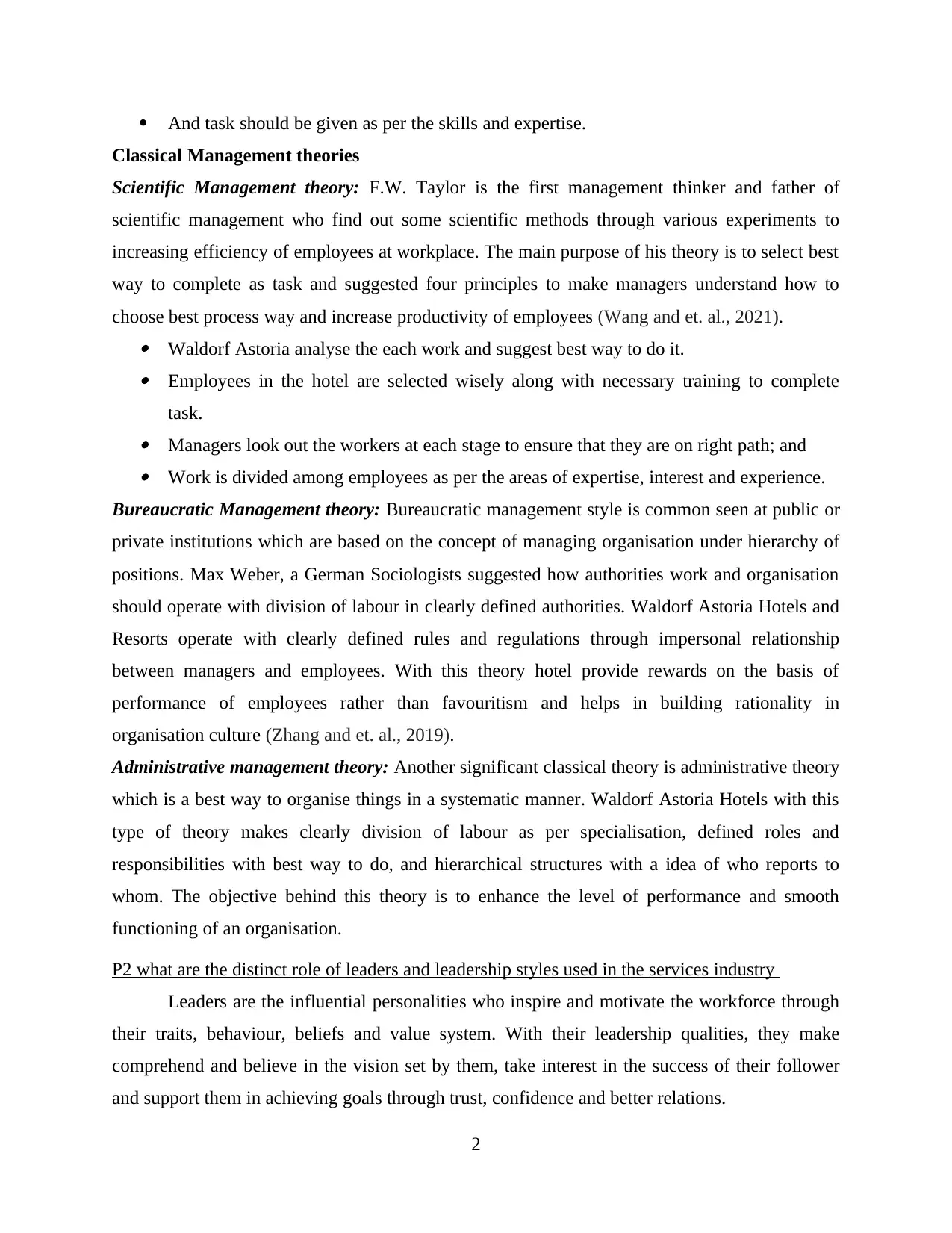
And task should be given as per the skills and expertise.
Classical Management theories
Scientific Management theory: F.W. Taylor is the first management thinker and father of
scientific management who find out some scientific methods through various experiments to
increasing efficiency of employees at workplace. The main purpose of his theory is to select best
way to complete as task and suggested four principles to make managers understand how to
choose best process way and increase productivity of employees (Wang and et. al., 2021). Waldorf Astoria analyse the each work and suggest best way to do it. Employees in the hotel are selected wisely along with necessary training to complete
task. Managers look out the workers at each stage to ensure that they are on right path; and Work is divided among employees as per the areas of expertise, interest and experience.
Bureaucratic Management theory: Bureaucratic management style is common seen at public or
private institutions which are based on the concept of managing organisation under hierarchy of
positions. Max Weber, a German Sociologists suggested how authorities work and organisation
should operate with division of labour in clearly defined authorities. Waldorf Astoria Hotels and
Resorts operate with clearly defined rules and regulations through impersonal relationship
between managers and employees. With this theory hotel provide rewards on the basis of
performance of employees rather than favouritism and helps in building rationality in
organisation culture (Zhang and et. al., 2019).
Administrative management theory: Another significant classical theory is administrative theory
which is a best way to organise things in a systematic manner. Waldorf Astoria Hotels with this
type of theory makes clearly division of labour as per specialisation, defined roles and
responsibilities with best way to do, and hierarchical structures with a idea of who reports to
whom. The objective behind this theory is to enhance the level of performance and smooth
functioning of an organisation.
P2 what are the distinct role of leaders and leadership styles used in the services industry
Leaders are the influential personalities who inspire and motivate the workforce through
their traits, behaviour, beliefs and value system. With their leadership qualities, they make
comprehend and believe in the vision set by them, take interest in the success of their follower
and support them in achieving goals through trust, confidence and better relations.
2
Classical Management theories
Scientific Management theory: F.W. Taylor is the first management thinker and father of
scientific management who find out some scientific methods through various experiments to
increasing efficiency of employees at workplace. The main purpose of his theory is to select best
way to complete as task and suggested four principles to make managers understand how to
choose best process way and increase productivity of employees (Wang and et. al., 2021). Waldorf Astoria analyse the each work and suggest best way to do it. Employees in the hotel are selected wisely along with necessary training to complete
task. Managers look out the workers at each stage to ensure that they are on right path; and Work is divided among employees as per the areas of expertise, interest and experience.
Bureaucratic Management theory: Bureaucratic management style is common seen at public or
private institutions which are based on the concept of managing organisation under hierarchy of
positions. Max Weber, a German Sociologists suggested how authorities work and organisation
should operate with division of labour in clearly defined authorities. Waldorf Astoria Hotels and
Resorts operate with clearly defined rules and regulations through impersonal relationship
between managers and employees. With this theory hotel provide rewards on the basis of
performance of employees rather than favouritism and helps in building rationality in
organisation culture (Zhang and et. al., 2019).
Administrative management theory: Another significant classical theory is administrative theory
which is a best way to organise things in a systematic manner. Waldorf Astoria Hotels with this
type of theory makes clearly division of labour as per specialisation, defined roles and
responsibilities with best way to do, and hierarchical structures with a idea of who reports to
whom. The objective behind this theory is to enhance the level of performance and smooth
functioning of an organisation.
P2 what are the distinct role of leaders and leadership styles used in the services industry
Leaders are the influential personalities who inspire and motivate the workforce through
their traits, behaviour, beliefs and value system. With their leadership qualities, they make
comprehend and believe in the vision set by them, take interest in the success of their follower
and support them in achieving goals through trust, confidence and better relations.
2
Paraphrase This Document
Need a fresh take? Get an instant paraphrase of this document with our AI Paraphraser
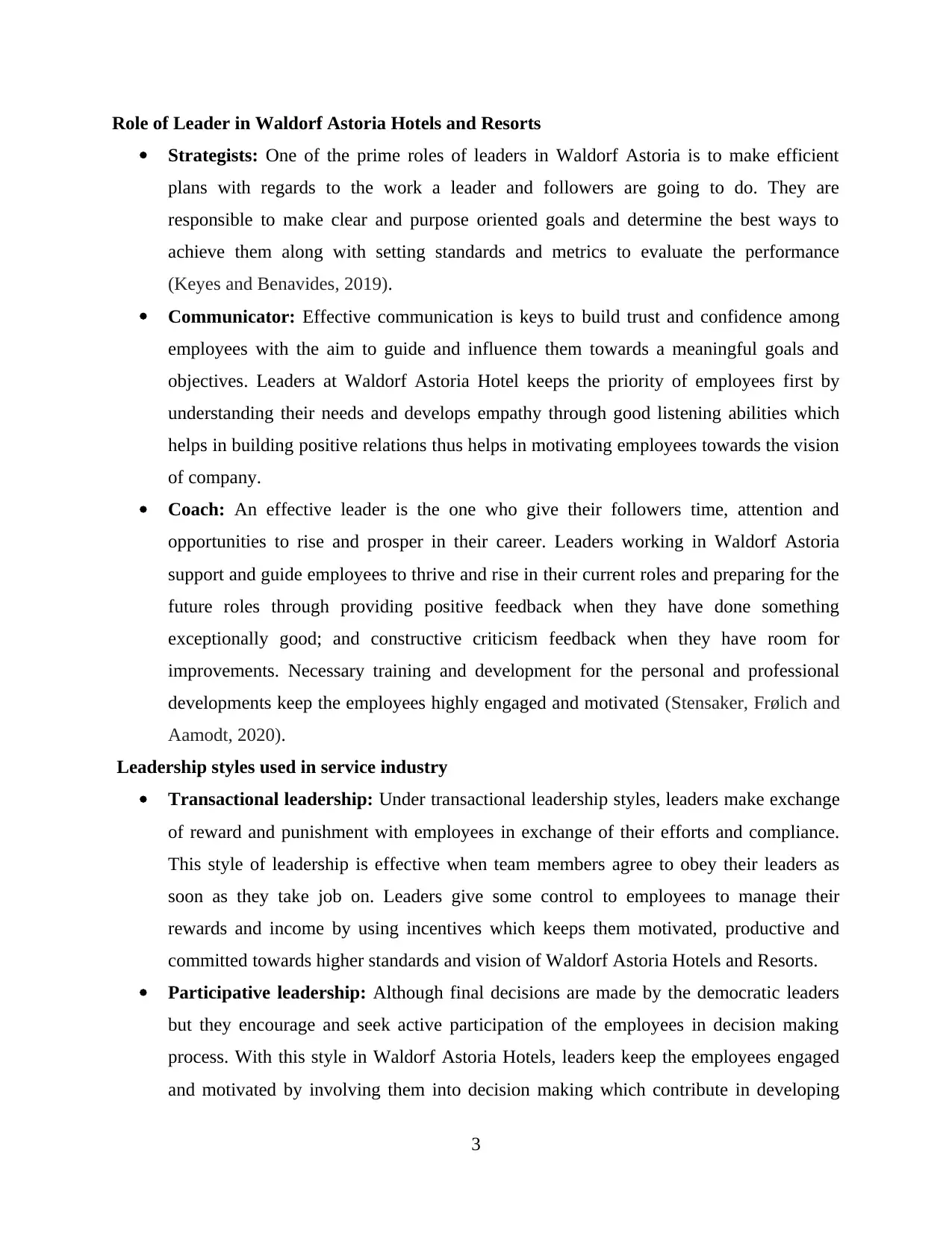
Role of Leader in Waldorf Astoria Hotels and Resorts
Strategists: One of the prime roles of leaders in Waldorf Astoria is to make efficient
plans with regards to the work a leader and followers are going to do. They are
responsible to make clear and purpose oriented goals and determine the best ways to
achieve them along with setting standards and metrics to evaluate the performance
(Keyes and Benavides, 2019).
Communicator: Effective communication is keys to build trust and confidence among
employees with the aim to guide and influence them towards a meaningful goals and
objectives. Leaders at Waldorf Astoria Hotel keeps the priority of employees first by
understanding their needs and develops empathy through good listening abilities which
helps in building positive relations thus helps in motivating employees towards the vision
of company.
Coach: An effective leader is the one who give their followers time, attention and
opportunities to rise and prosper in their career. Leaders working in Waldorf Astoria
support and guide employees to thrive and rise in their current roles and preparing for the
future roles through providing positive feedback when they have done something
exceptionally good; and constructive criticism feedback when they have room for
improvements. Necessary training and development for the personal and professional
developments keep the employees highly engaged and motivated (Stensaker, Frølich and
Aamodt, 2020).
Leadership styles used in service industry
Transactional leadership: Under transactional leadership styles, leaders make exchange
of reward and punishment with employees in exchange of their efforts and compliance.
This style of leadership is effective when team members agree to obey their leaders as
soon as they take job on. Leaders give some control to employees to manage their
rewards and income by using incentives which keeps them motivated, productive and
committed towards higher standards and vision of Waldorf Astoria Hotels and Resorts.
Participative leadership: Although final decisions are made by the democratic leaders
but they encourage and seek active participation of the employees in decision making
process. With this style in Waldorf Astoria Hotels, leaders keep the employees engaged
and motivated by involving them into decision making which contribute in developing
3
Strategists: One of the prime roles of leaders in Waldorf Astoria is to make efficient
plans with regards to the work a leader and followers are going to do. They are
responsible to make clear and purpose oriented goals and determine the best ways to
achieve them along with setting standards and metrics to evaluate the performance
(Keyes and Benavides, 2019).
Communicator: Effective communication is keys to build trust and confidence among
employees with the aim to guide and influence them towards a meaningful goals and
objectives. Leaders at Waldorf Astoria Hotel keeps the priority of employees first by
understanding their needs and develops empathy through good listening abilities which
helps in building positive relations thus helps in motivating employees towards the vision
of company.
Coach: An effective leader is the one who give their followers time, attention and
opportunities to rise and prosper in their career. Leaders working in Waldorf Astoria
support and guide employees to thrive and rise in their current roles and preparing for the
future roles through providing positive feedback when they have done something
exceptionally good; and constructive criticism feedback when they have room for
improvements. Necessary training and development for the personal and professional
developments keep the employees highly engaged and motivated (Stensaker, Frølich and
Aamodt, 2020).
Leadership styles used in service industry
Transactional leadership: Under transactional leadership styles, leaders make exchange
of reward and punishment with employees in exchange of their efforts and compliance.
This style of leadership is effective when team members agree to obey their leaders as
soon as they take job on. Leaders give some control to employees to manage their
rewards and income by using incentives which keeps them motivated, productive and
committed towards higher standards and vision of Waldorf Astoria Hotels and Resorts.
Participative leadership: Although final decisions are made by the democratic leaders
but they encourage and seek active participation of the employees in decision making
process. With this style in Waldorf Astoria Hotels, leaders keep the employees engaged
and motivated by involving them into decision making which contribute in developing
3
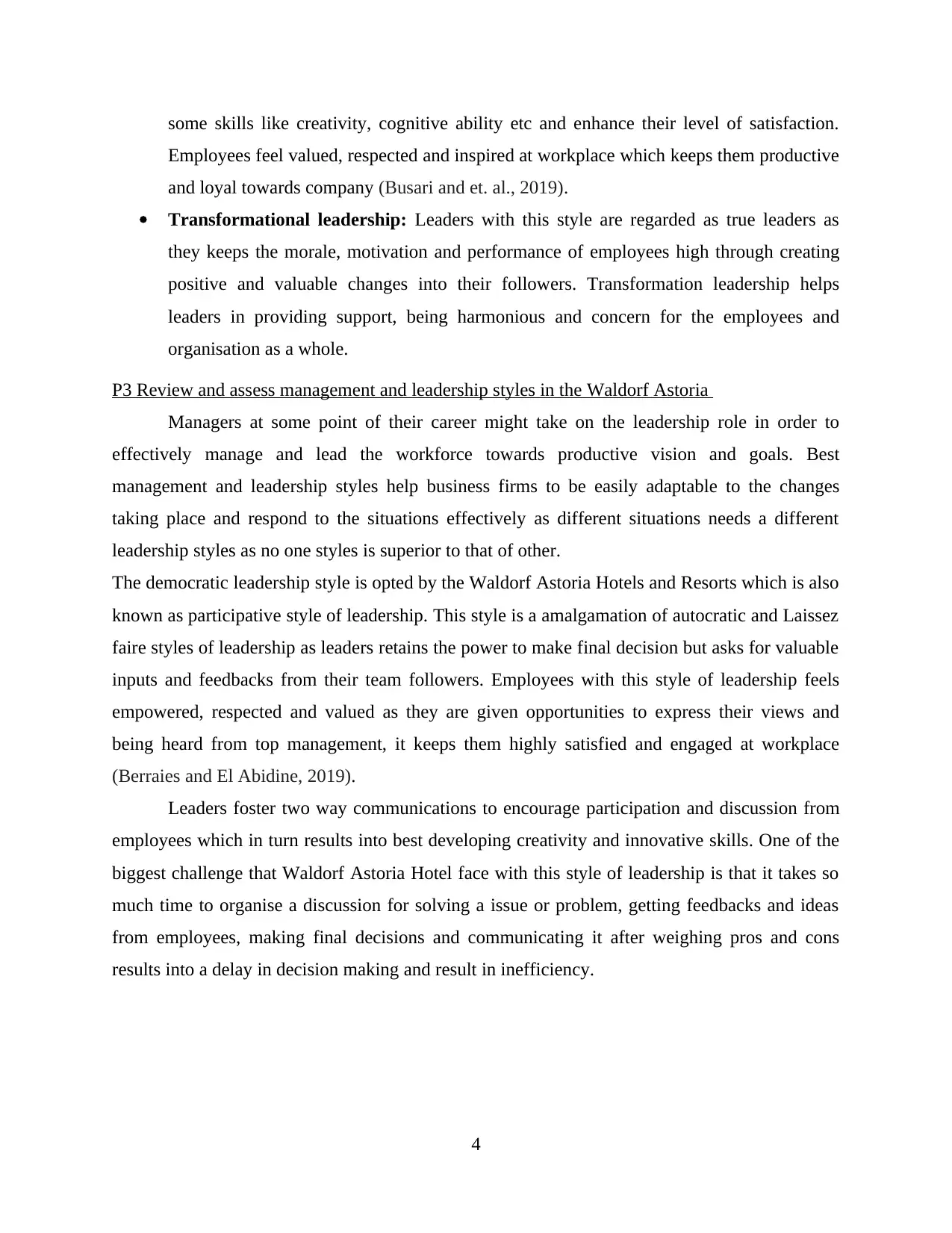
some skills like creativity, cognitive ability etc and enhance their level of satisfaction.
Employees feel valued, respected and inspired at workplace which keeps them productive
and loyal towards company (Busari and et. al., 2019).
Transformational leadership: Leaders with this style are regarded as true leaders as
they keeps the morale, motivation and performance of employees high through creating
positive and valuable changes into their followers. Transformation leadership helps
leaders in providing support, being harmonious and concern for the employees and
organisation as a whole.
P3 Review and assess management and leadership styles in the Waldorf Astoria
Managers at some point of their career might take on the leadership role in order to
effectively manage and lead the workforce towards productive vision and goals. Best
management and leadership styles help business firms to be easily adaptable to the changes
taking place and respond to the situations effectively as different situations needs a different
leadership styles as no one styles is superior to that of other.
The democratic leadership style is opted by the Waldorf Astoria Hotels and Resorts which is also
known as participative style of leadership. This style is a amalgamation of autocratic and Laissez
faire styles of leadership as leaders retains the power to make final decision but asks for valuable
inputs and feedbacks from their team followers. Employees with this style of leadership feels
empowered, respected and valued as they are given opportunities to express their views and
being heard from top management, it keeps them highly satisfied and engaged at workplace
(Berraies and El Abidine, 2019).
Leaders foster two way communications to encourage participation and discussion from
employees which in turn results into best developing creativity and innovative skills. One of the
biggest challenge that Waldorf Astoria Hotel face with this style of leadership is that it takes so
much time to organise a discussion for solving a issue or problem, getting feedbacks and ideas
from employees, making final decisions and communicating it after weighing pros and cons
results into a delay in decision making and result in inefficiency.
4
Employees feel valued, respected and inspired at workplace which keeps them productive
and loyal towards company (Busari and et. al., 2019).
Transformational leadership: Leaders with this style are regarded as true leaders as
they keeps the morale, motivation and performance of employees high through creating
positive and valuable changes into their followers. Transformation leadership helps
leaders in providing support, being harmonious and concern for the employees and
organisation as a whole.
P3 Review and assess management and leadership styles in the Waldorf Astoria
Managers at some point of their career might take on the leadership role in order to
effectively manage and lead the workforce towards productive vision and goals. Best
management and leadership styles help business firms to be easily adaptable to the changes
taking place and respond to the situations effectively as different situations needs a different
leadership styles as no one styles is superior to that of other.
The democratic leadership style is opted by the Waldorf Astoria Hotels and Resorts which is also
known as participative style of leadership. This style is a amalgamation of autocratic and Laissez
faire styles of leadership as leaders retains the power to make final decision but asks for valuable
inputs and feedbacks from their team followers. Employees with this style of leadership feels
empowered, respected and valued as they are given opportunities to express their views and
being heard from top management, it keeps them highly satisfied and engaged at workplace
(Berraies and El Abidine, 2019).
Leaders foster two way communications to encourage participation and discussion from
employees which in turn results into best developing creativity and innovative skills. One of the
biggest challenge that Waldorf Astoria Hotel face with this style of leadership is that it takes so
much time to organise a discussion for solving a issue or problem, getting feedbacks and ideas
from employees, making final decisions and communicating it after weighing pros and cons
results into a delay in decision making and result in inefficiency.
4
⊘ This is a preview!⊘
Do you want full access?
Subscribe today to unlock all pages.

Trusted by 1+ million students worldwide
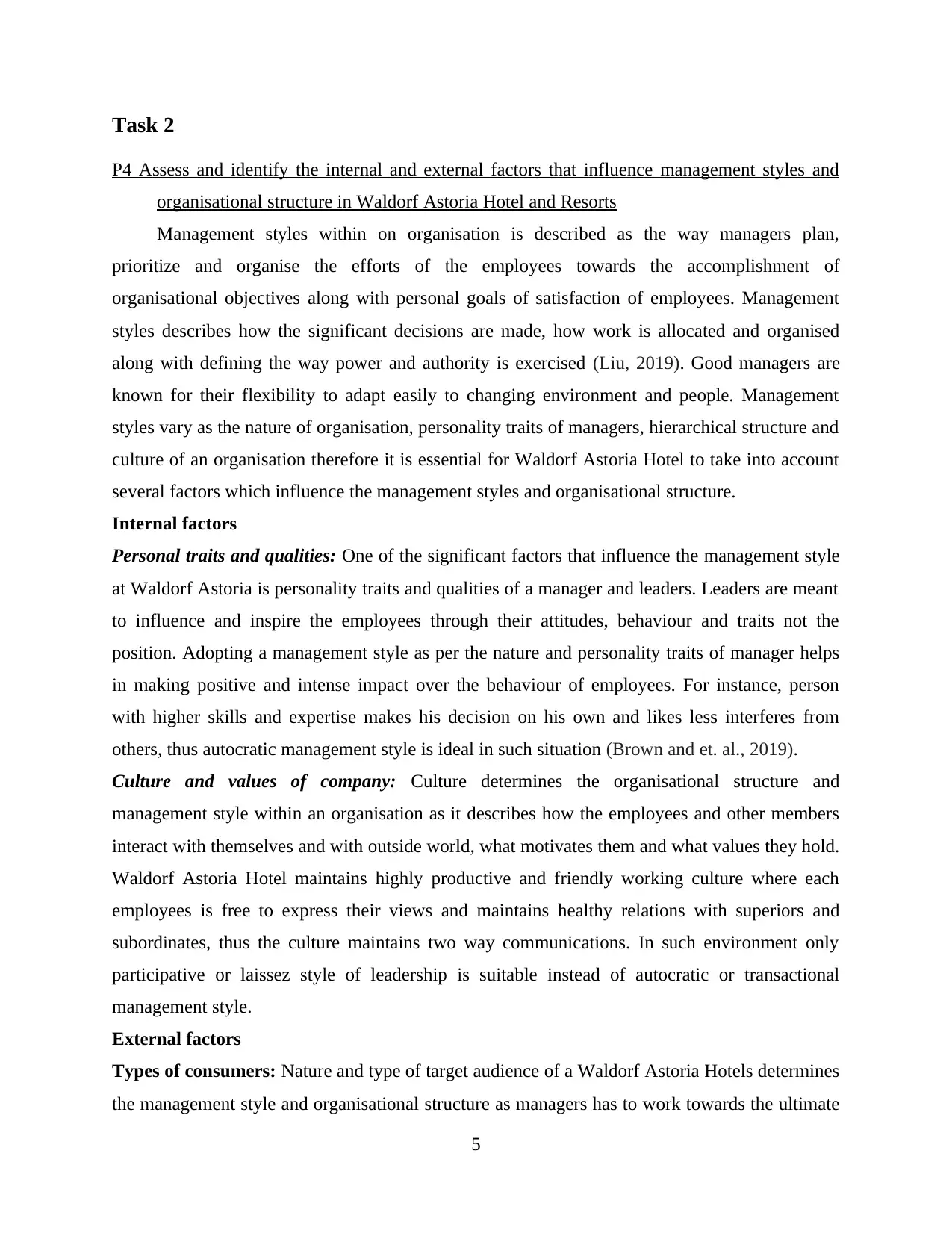
Task 2
P4 Assess and identify the internal and external factors that influence management styles and
organisational structure in Waldorf Astoria Hotel and Resorts
Management styles within on organisation is described as the way managers plan,
prioritize and organise the efforts of the employees towards the accomplishment of
organisational objectives along with personal goals of satisfaction of employees. Management
styles describes how the significant decisions are made, how work is allocated and organised
along with defining the way power and authority is exercised (Liu, 2019). Good managers are
known for their flexibility to adapt easily to changing environment and people. Management
styles vary as the nature of organisation, personality traits of managers, hierarchical structure and
culture of an organisation therefore it is essential for Waldorf Astoria Hotel to take into account
several factors which influence the management styles and organisational structure.
Internal factors
Personal traits and qualities: One of the significant factors that influence the management style
at Waldorf Astoria is personality traits and qualities of a manager and leaders. Leaders are meant
to influence and inspire the employees through their attitudes, behaviour and traits not the
position. Adopting a management style as per the nature and personality traits of manager helps
in making positive and intense impact over the behaviour of employees. For instance, person
with higher skills and expertise makes his decision on his own and likes less interferes from
others, thus autocratic management style is ideal in such situation (Brown and et. al., 2019).
Culture and values of company: Culture determines the organisational structure and
management style within an organisation as it describes how the employees and other members
interact with themselves and with outside world, what motivates them and what values they hold.
Waldorf Astoria Hotel maintains highly productive and friendly working culture where each
employees is free to express their views and maintains healthy relations with superiors and
subordinates, thus the culture maintains two way communications. In such environment only
participative or laissez style of leadership is suitable instead of autocratic or transactional
management style.
External factors
Types of consumers: Nature and type of target audience of a Waldorf Astoria Hotels determines
the management style and organisational structure as managers has to work towards the ultimate
5
P4 Assess and identify the internal and external factors that influence management styles and
organisational structure in Waldorf Astoria Hotel and Resorts
Management styles within on organisation is described as the way managers plan,
prioritize and organise the efforts of the employees towards the accomplishment of
organisational objectives along with personal goals of satisfaction of employees. Management
styles describes how the significant decisions are made, how work is allocated and organised
along with defining the way power and authority is exercised (Liu, 2019). Good managers are
known for their flexibility to adapt easily to changing environment and people. Management
styles vary as the nature of organisation, personality traits of managers, hierarchical structure and
culture of an organisation therefore it is essential for Waldorf Astoria Hotel to take into account
several factors which influence the management styles and organisational structure.
Internal factors
Personal traits and qualities: One of the significant factors that influence the management style
at Waldorf Astoria is personality traits and qualities of a manager and leaders. Leaders are meant
to influence and inspire the employees through their attitudes, behaviour and traits not the
position. Adopting a management style as per the nature and personality traits of manager helps
in making positive and intense impact over the behaviour of employees. For instance, person
with higher skills and expertise makes his decision on his own and likes less interferes from
others, thus autocratic management style is ideal in such situation (Brown and et. al., 2019).
Culture and values of company: Culture determines the organisational structure and
management style within an organisation as it describes how the employees and other members
interact with themselves and with outside world, what motivates them and what values they hold.
Waldorf Astoria Hotel maintains highly productive and friendly working culture where each
employees is free to express their views and maintains healthy relations with superiors and
subordinates, thus the culture maintains two way communications. In such environment only
participative or laissez style of leadership is suitable instead of autocratic or transactional
management style.
External factors
Types of consumers: Nature and type of target audience of a Waldorf Astoria Hotels determines
the management style and organisational structure as managers has to work towards the ultimate
5
Paraphrase This Document
Need a fresh take? Get an instant paraphrase of this document with our AI Paraphraser
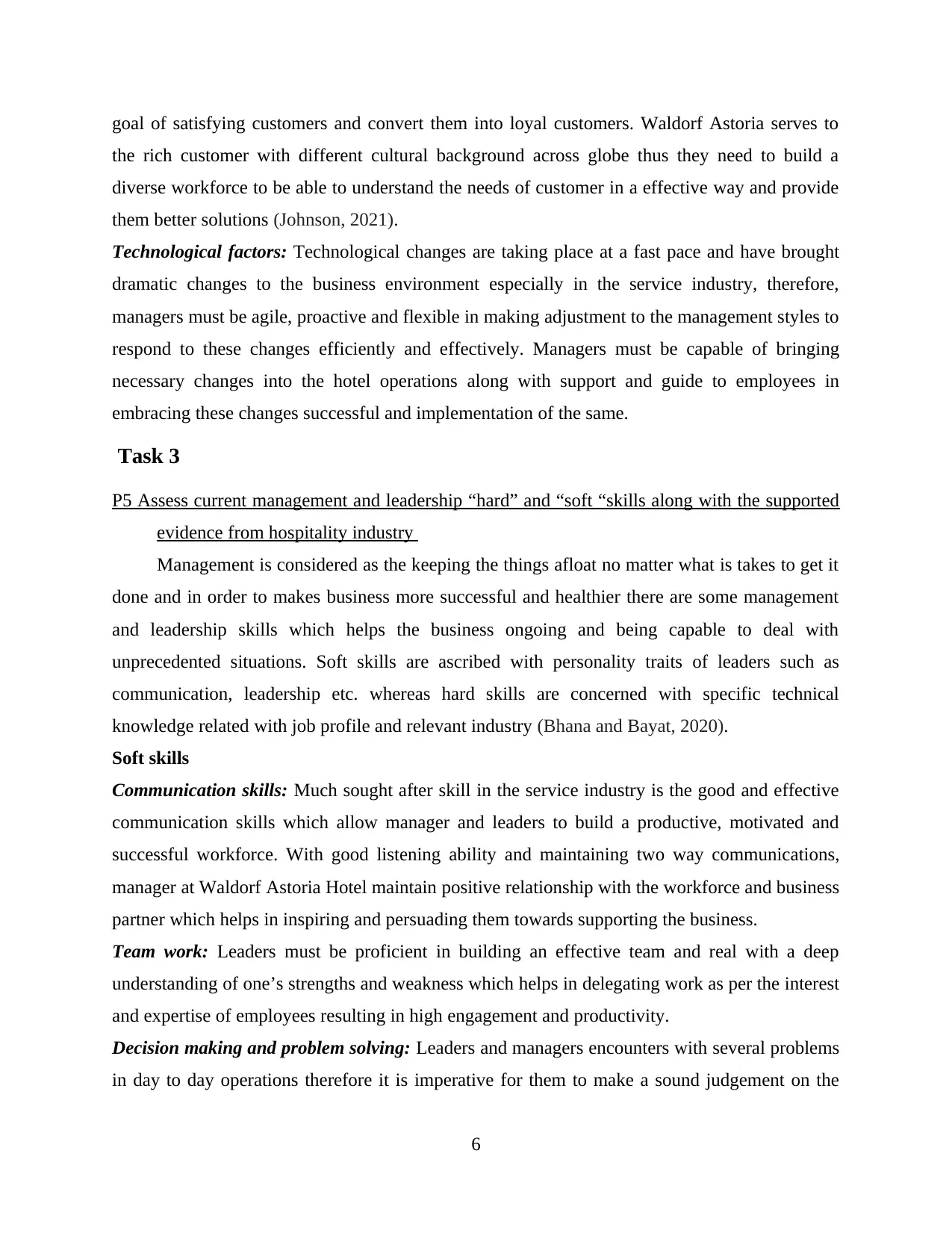
goal of satisfying customers and convert them into loyal customers. Waldorf Astoria serves to
the rich customer with different cultural background across globe thus they need to build a
diverse workforce to be able to understand the needs of customer in a effective way and provide
them better solutions (Johnson, 2021).
Technological factors: Technological changes are taking place at a fast pace and have brought
dramatic changes to the business environment especially in the service industry, therefore,
managers must be agile, proactive and flexible in making adjustment to the management styles to
respond to these changes efficiently and effectively. Managers must be capable of bringing
necessary changes into the hotel operations along with support and guide to employees in
embracing these changes successful and implementation of the same.
Task 3
P5 Assess current management and leadership “hard” and “soft “skills along with the supported
evidence from hospitality industry
Management is considered as the keeping the things afloat no matter what is takes to get it
done and in order to makes business more successful and healthier there are some management
and leadership skills which helps the business ongoing and being capable to deal with
unprecedented situations. Soft skills are ascribed with personality traits of leaders such as
communication, leadership etc. whereas hard skills are concerned with specific technical
knowledge related with job profile and relevant industry (Bhana and Bayat, 2020).
Soft skills
Communication skills: Much sought after skill in the service industry is the good and effective
communication skills which allow manager and leaders to build a productive, motivated and
successful workforce. With good listening ability and maintaining two way communications,
manager at Waldorf Astoria Hotel maintain positive relationship with the workforce and business
partner which helps in inspiring and persuading them towards supporting the business.
Team work: Leaders must be proficient in building an effective team and real with a deep
understanding of one’s strengths and weakness which helps in delegating work as per the interest
and expertise of employees resulting in high engagement and productivity.
Decision making and problem solving: Leaders and managers encounters with several problems
in day to day operations therefore it is imperative for them to make a sound judgement on the
6
the rich customer with different cultural background across globe thus they need to build a
diverse workforce to be able to understand the needs of customer in a effective way and provide
them better solutions (Johnson, 2021).
Technological factors: Technological changes are taking place at a fast pace and have brought
dramatic changes to the business environment especially in the service industry, therefore,
managers must be agile, proactive and flexible in making adjustment to the management styles to
respond to these changes efficiently and effectively. Managers must be capable of bringing
necessary changes into the hotel operations along with support and guide to employees in
embracing these changes successful and implementation of the same.
Task 3
P5 Assess current management and leadership “hard” and “soft “skills along with the supported
evidence from hospitality industry
Management is considered as the keeping the things afloat no matter what is takes to get it
done and in order to makes business more successful and healthier there are some management
and leadership skills which helps the business ongoing and being capable to deal with
unprecedented situations. Soft skills are ascribed with personality traits of leaders such as
communication, leadership etc. whereas hard skills are concerned with specific technical
knowledge related with job profile and relevant industry (Bhana and Bayat, 2020).
Soft skills
Communication skills: Much sought after skill in the service industry is the good and effective
communication skills which allow manager and leaders to build a productive, motivated and
successful workforce. With good listening ability and maintaining two way communications,
manager at Waldorf Astoria Hotel maintain positive relationship with the workforce and business
partner which helps in inspiring and persuading them towards supporting the business.
Team work: Leaders must be proficient in building an effective team and real with a deep
understanding of one’s strengths and weakness which helps in delegating work as per the interest
and expertise of employees resulting in high engagement and productivity.
Decision making and problem solving: Leaders and managers encounters with several problems
in day to day operations therefore it is imperative for them to make a sound judgement on the
6
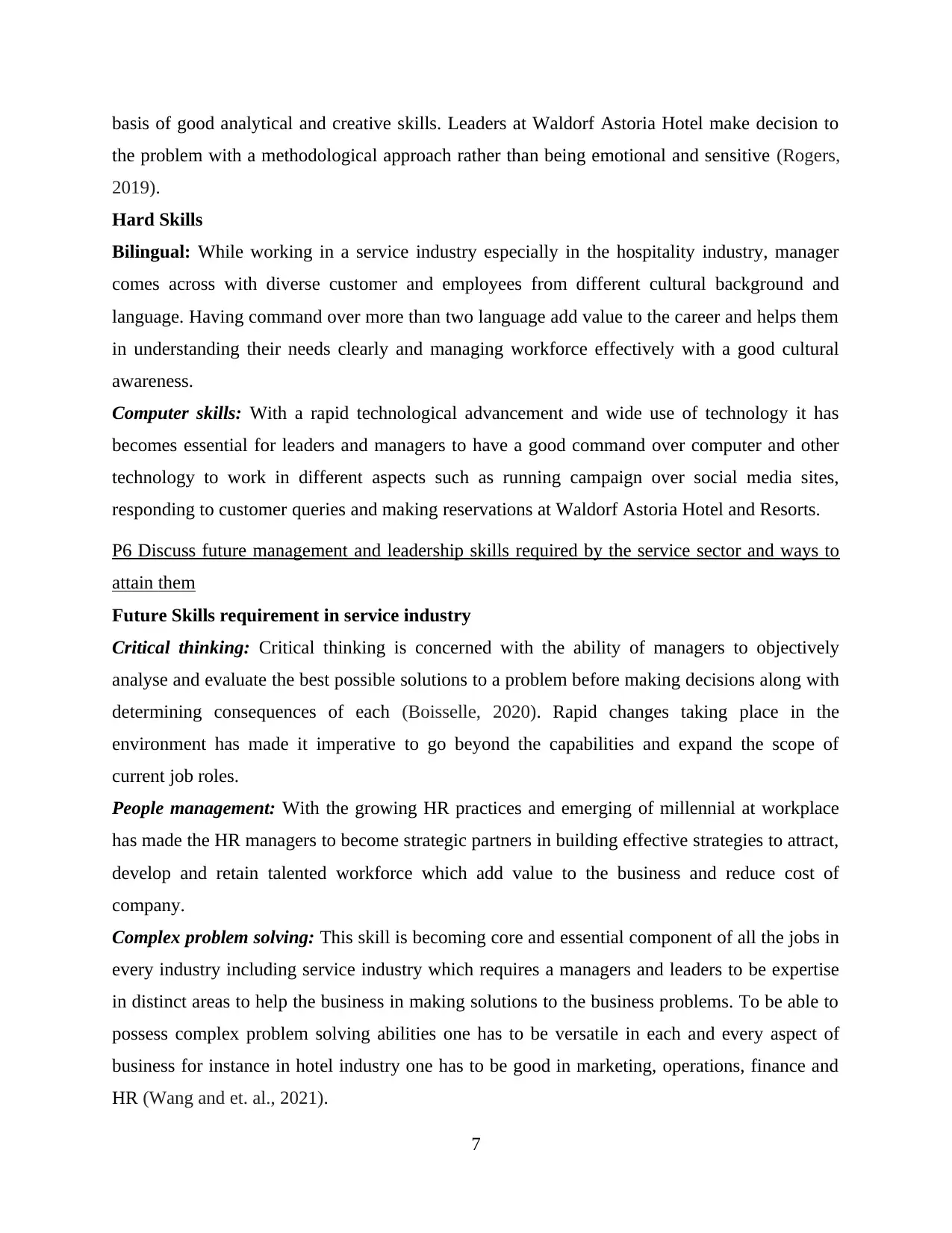
basis of good analytical and creative skills. Leaders at Waldorf Astoria Hotel make decision to
the problem with a methodological approach rather than being emotional and sensitive (Rogers,
2019).
Hard Skills
Bilingual: While working in a service industry especially in the hospitality industry, manager
comes across with diverse customer and employees from different cultural background and
language. Having command over more than two language add value to the career and helps them
in understanding their needs clearly and managing workforce effectively with a good cultural
awareness.
Computer skills: With a rapid technological advancement and wide use of technology it has
becomes essential for leaders and managers to have a good command over computer and other
technology to work in different aspects such as running campaign over social media sites,
responding to customer queries and making reservations at Waldorf Astoria Hotel and Resorts.
P6 Discuss future management and leadership skills required by the service sector and ways to
attain them
Future Skills requirement in service industry
Critical thinking: Critical thinking is concerned with the ability of managers to objectively
analyse and evaluate the best possible solutions to a problem before making decisions along with
determining consequences of each (Boisselle, 2020). Rapid changes taking place in the
environment has made it imperative to go beyond the capabilities and expand the scope of
current job roles.
People management: With the growing HR practices and emerging of millennial at workplace
has made the HR managers to become strategic partners in building effective strategies to attract,
develop and retain talented workforce which add value to the business and reduce cost of
company.
Complex problem solving: This skill is becoming core and essential component of all the jobs in
every industry including service industry which requires a managers and leaders to be expertise
in distinct areas to help the business in making solutions to the business problems. To be able to
possess complex problem solving abilities one has to be versatile in each and every aspect of
business for instance in hotel industry one has to be good in marketing, operations, finance and
HR (Wang and et. al., 2021).
7
the problem with a methodological approach rather than being emotional and sensitive (Rogers,
2019).
Hard Skills
Bilingual: While working in a service industry especially in the hospitality industry, manager
comes across with diverse customer and employees from different cultural background and
language. Having command over more than two language add value to the career and helps them
in understanding their needs clearly and managing workforce effectively with a good cultural
awareness.
Computer skills: With a rapid technological advancement and wide use of technology it has
becomes essential for leaders and managers to have a good command over computer and other
technology to work in different aspects such as running campaign over social media sites,
responding to customer queries and making reservations at Waldorf Astoria Hotel and Resorts.
P6 Discuss future management and leadership skills required by the service sector and ways to
attain them
Future Skills requirement in service industry
Critical thinking: Critical thinking is concerned with the ability of managers to objectively
analyse and evaluate the best possible solutions to a problem before making decisions along with
determining consequences of each (Boisselle, 2020). Rapid changes taking place in the
environment has made it imperative to go beyond the capabilities and expand the scope of
current job roles.
People management: With the growing HR practices and emerging of millennial at workplace
has made the HR managers to become strategic partners in building effective strategies to attract,
develop and retain talented workforce which add value to the business and reduce cost of
company.
Complex problem solving: This skill is becoming core and essential component of all the jobs in
every industry including service industry which requires a managers and leaders to be expertise
in distinct areas to help the business in making solutions to the business problems. To be able to
possess complex problem solving abilities one has to be versatile in each and every aspect of
business for instance in hotel industry one has to be good in marketing, operations, finance and
HR (Wang and et. al., 2021).
7
⊘ This is a preview!⊘
Do you want full access?
Subscribe today to unlock all pages.

Trusted by 1+ million students worldwide
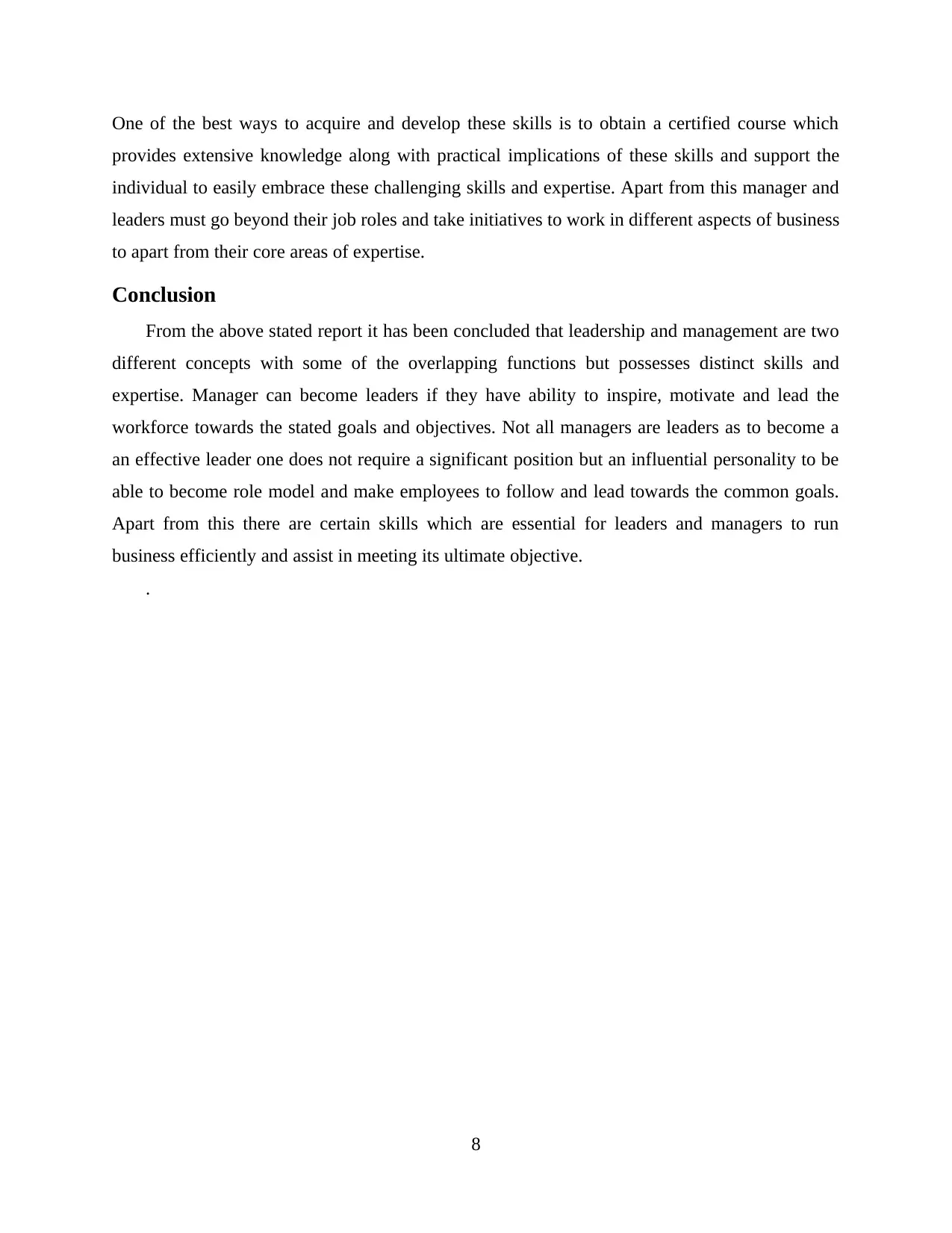
One of the best ways to acquire and develop these skills is to obtain a certified course which
provides extensive knowledge along with practical implications of these skills and support the
individual to easily embrace these challenging skills and expertise. Apart from this manager and
leaders must go beyond their job roles and take initiatives to work in different aspects of business
to apart from their core areas of expertise.
Conclusion
From the above stated report it has been concluded that leadership and management are two
different concepts with some of the overlapping functions but possesses distinct skills and
expertise. Manager can become leaders if they have ability to inspire, motivate and lead the
workforce towards the stated goals and objectives. Not all managers are leaders as to become a
an effective leader one does not require a significant position but an influential personality to be
able to become role model and make employees to follow and lead towards the common goals.
Apart from this there are certain skills which are essential for leaders and managers to run
business efficiently and assist in meeting its ultimate objective.
.
8
provides extensive knowledge along with practical implications of these skills and support the
individual to easily embrace these challenging skills and expertise. Apart from this manager and
leaders must go beyond their job roles and take initiatives to work in different aspects of business
to apart from their core areas of expertise.
Conclusion
From the above stated report it has been concluded that leadership and management are two
different concepts with some of the overlapping functions but possesses distinct skills and
expertise. Manager can become leaders if they have ability to inspire, motivate and lead the
workforce towards the stated goals and objectives. Not all managers are leaders as to become a
an effective leader one does not require a significant position but an influential personality to be
able to become role model and make employees to follow and lead towards the common goals.
Apart from this there are certain skills which are essential for leaders and managers to run
business efficiently and assist in meeting its ultimate objective.
.
8
Paraphrase This Document
Need a fresh take? Get an instant paraphrase of this document with our AI Paraphraser
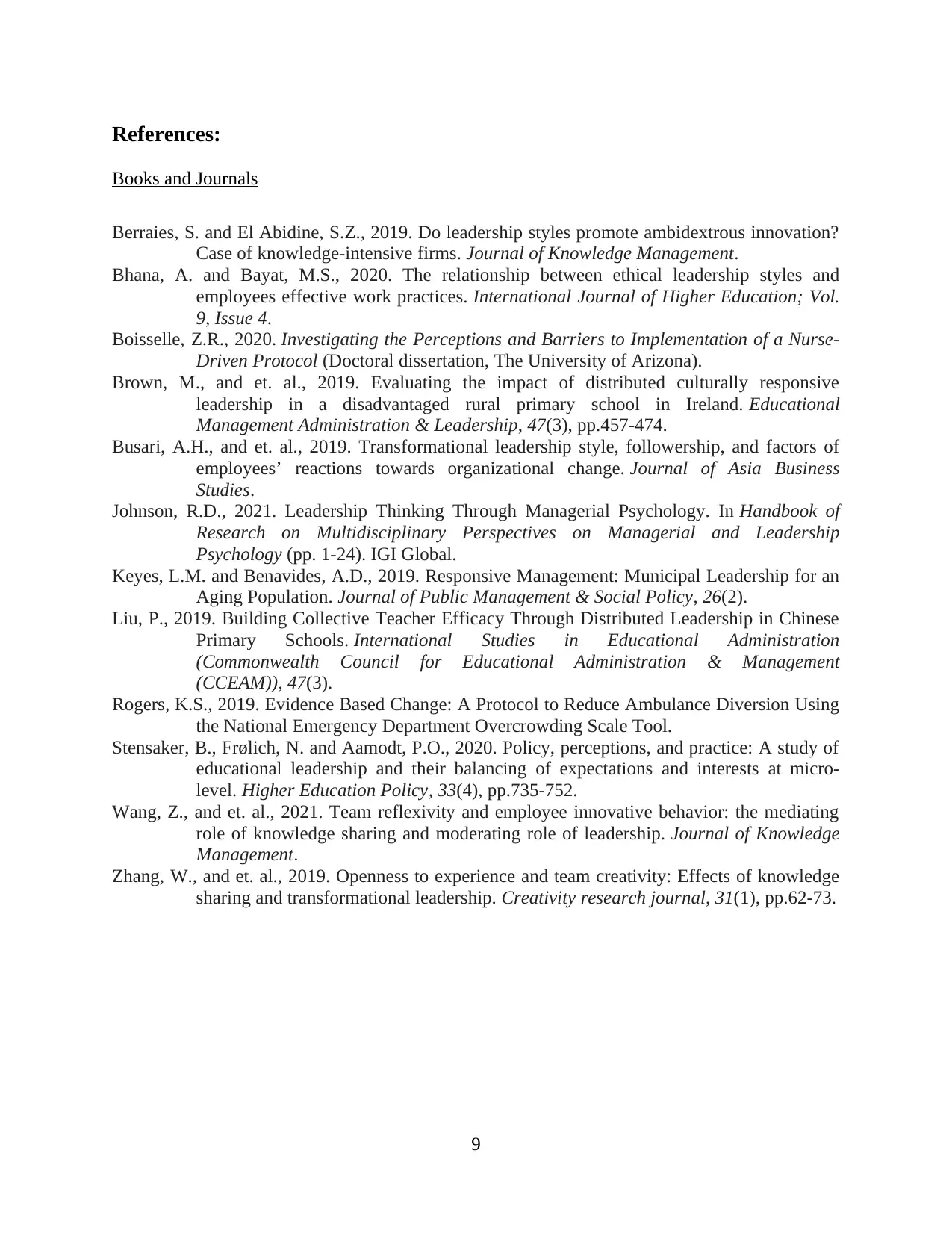
References:
Books and Journals
Berraies, S. and El Abidine, S.Z., 2019. Do leadership styles promote ambidextrous innovation?
Case of knowledge-intensive firms. Journal of Knowledge Management.
Bhana, A. and Bayat, M.S., 2020. The relationship between ethical leadership styles and
employees effective work practices. International Journal of Higher Education; Vol.
9, Issue 4.
Boisselle, Z.R., 2020. Investigating the Perceptions and Barriers to Implementation of a Nurse-
Driven Protocol (Doctoral dissertation, The University of Arizona).
Brown, M., and et. al., 2019. Evaluating the impact of distributed culturally responsive
leadership in a disadvantaged rural primary school in Ireland. Educational
Management Administration & Leadership, 47(3), pp.457-474.
Busari, A.H., and et. al., 2019. Transformational leadership style, followership, and factors of
employees’ reactions towards organizational change. Journal of Asia Business
Studies.
Johnson, R.D., 2021. Leadership Thinking Through Managerial Psychology. In Handbook of
Research on Multidisciplinary Perspectives on Managerial and Leadership
Psychology (pp. 1-24). IGI Global.
Keyes, L.M. and Benavides, A.D., 2019. Responsive Management: Municipal Leadership for an
Aging Population. Journal of Public Management & Social Policy, 26(2).
Liu, P., 2019. Building Collective Teacher Efficacy Through Distributed Leadership in Chinese
Primary Schools. International Studies in Educational Administration
(Commonwealth Council for Educational Administration & Management
(CCEAM)), 47(3).
Rogers, K.S., 2019. Evidence Based Change: A Protocol to Reduce Ambulance Diversion Using
the National Emergency Department Overcrowding Scale Tool.
Stensaker, B., Frølich, N. and Aamodt, P.O., 2020. Policy, perceptions, and practice: A study of
educational leadership and their balancing of expectations and interests at micro-
level. Higher Education Policy, 33(4), pp.735-752.
Wang, Z., and et. al., 2021. Team reflexivity and employee innovative behavior: the mediating
role of knowledge sharing and moderating role of leadership. Journal of Knowledge
Management.
Zhang, W., and et. al., 2019. Openness to experience and team creativity: Effects of knowledge
sharing and transformational leadership. Creativity research journal, 31(1), pp.62-73.
9
Books and Journals
Berraies, S. and El Abidine, S.Z., 2019. Do leadership styles promote ambidextrous innovation?
Case of knowledge-intensive firms. Journal of Knowledge Management.
Bhana, A. and Bayat, M.S., 2020. The relationship between ethical leadership styles and
employees effective work practices. International Journal of Higher Education; Vol.
9, Issue 4.
Boisselle, Z.R., 2020. Investigating the Perceptions and Barriers to Implementation of a Nurse-
Driven Protocol (Doctoral dissertation, The University of Arizona).
Brown, M., and et. al., 2019. Evaluating the impact of distributed culturally responsive
leadership in a disadvantaged rural primary school in Ireland. Educational
Management Administration & Leadership, 47(3), pp.457-474.
Busari, A.H., and et. al., 2019. Transformational leadership style, followership, and factors of
employees’ reactions towards organizational change. Journal of Asia Business
Studies.
Johnson, R.D., 2021. Leadership Thinking Through Managerial Psychology. In Handbook of
Research on Multidisciplinary Perspectives on Managerial and Leadership
Psychology (pp. 1-24). IGI Global.
Keyes, L.M. and Benavides, A.D., 2019. Responsive Management: Municipal Leadership for an
Aging Population. Journal of Public Management & Social Policy, 26(2).
Liu, P., 2019. Building Collective Teacher Efficacy Through Distributed Leadership in Chinese
Primary Schools. International Studies in Educational Administration
(Commonwealth Council for Educational Administration & Management
(CCEAM)), 47(3).
Rogers, K.S., 2019. Evidence Based Change: A Protocol to Reduce Ambulance Diversion Using
the National Emergency Department Overcrowding Scale Tool.
Stensaker, B., Frølich, N. and Aamodt, P.O., 2020. Policy, perceptions, and practice: A study of
educational leadership and their balancing of expectations and interests at micro-
level. Higher Education Policy, 33(4), pp.735-752.
Wang, Z., and et. al., 2021. Team reflexivity and employee innovative behavior: the mediating
role of knowledge sharing and moderating role of leadership. Journal of Knowledge
Management.
Zhang, W., and et. al., 2019. Openness to experience and team creativity: Effects of knowledge
sharing and transformational leadership. Creativity research journal, 31(1), pp.62-73.
9
1 out of 11
Related Documents
Your All-in-One AI-Powered Toolkit for Academic Success.
+13062052269
info@desklib.com
Available 24*7 on WhatsApp / Email
![[object Object]](/_next/static/media/star-bottom.7253800d.svg)
Unlock your academic potential
Copyright © 2020–2026 A2Z Services. All Rights Reserved. Developed and managed by ZUCOL.




